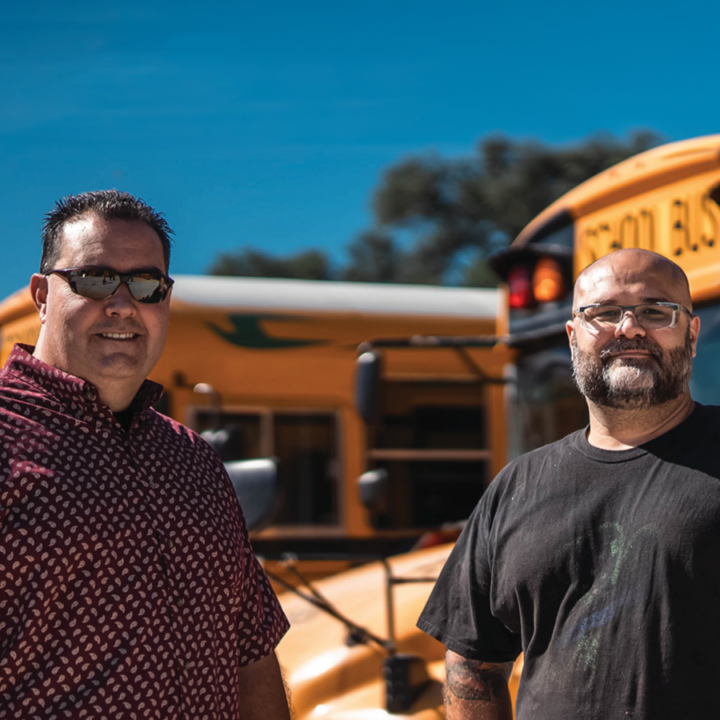COOK ILLINOIS CORPORATION DRIVES DOWN CARBON EMISSIONS WITH SWITCH FROM DIESEL TO PROPANE
The United States’ largest family-owned and operated school bus contractor, CookIllinois Corporation, has taken its latest step in a continued environmental drive, by expanding its fleet of propane-powered school buses.
+90%
Cut in NOx emissions
$500,000
Cut in overall costs
EPA & CARB
Compliant
The United States’ largest family-owned and operated school bus contractor, Cook-Illinois Corporation, has taken its latest step in a continued environmental drive, by expanding its fleet of propane-powered school buses.
Headquartered in Oak Brook, Illinois, Cook-Illinois Corporation operates across the Midwest, carrying over 100,000 kids per day to and from school, completing 3,200 journeys per day and covering 26,000,000 miles each year in the process.
Historically, school buses across the U.S. have run on diesel or gas, posing a large environmental problem, as they pumped high levels of carbon emissions, nitrogen oxides and particulate matter into the air. What’s worse, is that this air pollution was impacting some of our most vulnerable citizens: kids.
Cook Illinois Corporation, however, has been making a stand against this. With an objective to drastically reduce carbon emissions, its diesel and bio-diesel fleet to propane alongside other low-carbon fuel alternatives. Propane autogas is a nontoxic, non-carcinogenic and non-corrosive fuel that emits fewer greenhouse gases, smog producing hydrocarbons, nitrogen oxides and particulate emissions compared with gasoline or diesel. And, propane poses no harm to groundwater or soil, so the surrounding landscape and waterways are protected, too. Diesel exhaust, on the other hand, is identified by the World Health Organization as a carcinogen, which is why regulations are becoming tighter for districts choosing to keep diesel in their fleets.
With over 400 propane-powered school buses, it already has one of the largest propane fleets in the country, but its vision is to take that further, not only to protect our children, but also to help it meet state and federal legislation.
WE ARE SEEING HUGE SAVINGS BY OPERATING PROPANE BUSES. PROPANE AUTOGAS IS CHEAPER THAN DIESEL, MAINTENANCE COSTS ARE LOWER AND THERE IS A FEDERAL TAX REBATE ON PROPANE TOO.
Karl Harmann, Fleet Manager at Cook Illinois Corporation, said: “Like all bus companies, we’ve run diesel fleets for many years, but we’re changing that. Diesel is expensive, it’s high maintenance, but worst of all, pollution levels are high.
“By contrast, propane is cleaner and produces no nasty smoke or odors. There are many kids that can’t go on diesel buses, due to asthma or other respiratory issues, but that’s not the case with propane; every kid can use them. The schools and parents love them because it keeps the kids safer, and we’re at a point now where schools are actually requesting propane-fueled vehicles.”
But there are other advantages, too. Propane is a much cleaner burning fuel than diesel, so the engines need less maintenance. This means they spend more time on the road, and are cheaper to run than their diesel equivalents. There are also more mechanics that are trained to work on propane engines, so if there are ever any problems, they’re much easier to fix.
Then, of course, there’s the cost savings. Propane autogas is consistently cheaper than diesel, producing average annual savings of approximately $500,000.
With 17 school bus subsidiaries and operating propane autogas vehicles out of six sites, Cook-Illinois needed a propane supplier it could trust to install the infrastructure and provide a reliable and consistent supply of propane. For this, it turned to Hicksgas and Liberty Propane, both owned by parent company, DCC Propane, one of the largest propane providers in the U.S.
“We needed a partner we could rely on and trust,” said Harmann. “Hicksgas and Liberty Propane are exactly that. With the backing of a national player, they’re local vendors, independently run and always give us the personal attention we need. They make it easy for us and show our teams how easy it is to run propane buses.
“Fuel is the life source of our business, and I know that if there were ever to be a challenge, I could call them, and it would be handled straight away. One phone call and it would be followed up on. That’s vital for us. I would recommend them to anyone thinking of making the switch to propane.”
Scott Zacek, Sales Manager at Liberty Propane, said: “Cook Illinois is an inspirational company. With over 4,000 school buses across the Midwest, they’re working hard to convert as many of them to propane as they can. Every time used propane buses become available, Karl and his team try to purchase them. And every propane bus he puts on the road, replaces a diesel bus.”

Increasing the size of their propane fl eet is also helping Cook Illinois win tenders, as more and more schools are seeing the benefits of propane. As well as its advantages over diesel, propane is also seen by many as superior to electric. Zacek explains, “Not only do electric buses have a higher initial cost, but there are also range and charging limitations, battery disposal challenges, potentially unstainable power sources, and higher particulate matter (mainly micro-plastics) from tires, as electric buses are far heavier than propane vehicles. As Cook-Illinois has found, propane autogas is a fantastic solution.”
Karl Harmann concluded: “As we continue to increase our propane fleet, working with Hicksgas and Liberty Propane is a no-brainer for us. It makes sense on every level. Internally, people are sometimes worried about the safety aspect of switching to propane, but Scott’s team does a fantastic job of taking away that anxiety.
“I wish more people knew about propane, and about how clean and safe it is. There’s no infrastructure to wait for, like there is with electric buses. It’s here now, it’s super-safe, reduces pollution and it’s way more cost-effective.”
